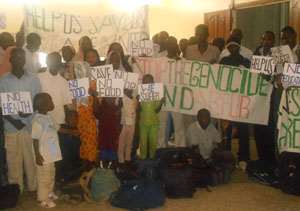
SUDANESE REFUGEES in Ghana are agitating for better living conditions at their Krisan Refugee Camp in the Western Region.
A number of them including women and children stormed the US Embassy in Accra yesterday, holding placards and banners and asking for food and an end to the genocide in their home country.
They accused the United Nations High Commission on Refugees (UNHCR) of not doing enough to mitigate their plight.
No sooner had the protesters, numbering about 76, arrived at the US Embassy than police officers from the Accra Regional Police Command closed in on them and took custody of them.
The 76 refugees were handed over to the Criminal Investigation Department (CID) Headquarters which confirmed from the UNHCR, the refugees' status of the protesters.
The CID Operations Director, ACP Frank Kwofie, said the CID, together with the UNHCR, was working with the Interior Ministry to find some relief for the aggrieved refugees.
A 51-year-old Ubeid Mohamed Habib, who was the spokesperson for the refugees, expressed disappointment at the action the police took by whisking them away without allowing them to present their petition to the US Consular.
He narrated that the Krisan Camp, which accommodated about 400 Sudanese refugees, lacked several basic amenities including water, food, mattresses, hospital and schools.
'We are housed in an uncompleted building without bed and mattresses.'
He said since 2009, food supply to the camp had ceased.
Mohamed explained that even though there was electricity supply to the camp, they were not able to access the facility because of the cost.
He pleaded with UNHCR to at least register them with the National Health Insurance Scheme (NHIS). He noted that the gesture would enable them to have access to good health.
They claimed they were virtually neglected as UNHCR had not done enough to integrate them into the Ghanaian society.
They did not have access to any means of education so communication was one of the barriers making it difficult to integrate into the society, he said, adding that UNHCR could engage the services of a teacher to teach them English.
The spokesperson stressed that the Sudanese were not protesting against Ghana because Ghanaians had been very welcoming but the UNHCR was their problem, suggesting that if the Ghana branch was unable to help, it could solicit the assistance of other member countries and relocate and offer them a better living condition.
But the programme coordinator, Tetteh Paddy, rebuffed some of the claims, saying the Ghana Education Service (GES) was running a school in the camp.
'However, the food supply programme is mainly sponsored by the World Food Programme (WFP) and that assistance ended in 2009. Now its focus is on emergency cases like that of La Cote d'Ivoire. Even the seven-year grace period for Cote d'Ivoire is running out of funds. If donors do not make money available they may soon have no supply'.
Paddy added that refugees were initially provided with all basic needs including food but were expected to integrate into their host countries after a period of time.
Asked whether they had taken any steps to assist the Sudanese in that direction, he disclosed that the UNHCR tried sometime ago to give them some employable skills in vocations such as farming, tailoring, and hair-dressing.
However, a number of the refugees resisted the offer, claiming it would block their chances of relocating to the Western countries like USA.
He suspected that most of the protesters might be among those who resisted the skills training offer.
The protesters, according to Paddy, broke the camp's rule by not informing the manager about their intention. They also failed to seek permission before leaving the camp. He believed that finding means of transport to Accra meant they had money on them, explaining that there was little or no help immediately as the UNHCR would have to source for funds from its donor partners before it could offer any assistance.
He said currently, funds for training were no longer available since the offer was earlier rejected.
The Sudanese, he noted, had been major beneficiaries of relocation to USA. He said countries who were prepared to have refugees from Ghana usually would notify UNHCR with specifics of the caliber of refugees they wanted to admit.
These countries send officers to Ghana to conduct their own interviews and selections. UNHCR is therefore not responsible for relocating refugees.
Tetteh Paddy stated that his outfit was working with the CID and the Ministry of Interior to see what help could be given to the protesters who were still at the CID Headquarters as at press time yesterday.
BY Rocklyn Antonio




 List of 24 ministerial nominees approved by Parliament
List of 24 ministerial nominees approved by Parliament
 You were my inspiration, made me who I am today – Lilian Kumah
You were my inspiration, made me who I am today – Lilian Kumah
 Rainstorm destroys Hohoe E.P. Senior High School building
Rainstorm destroys Hohoe E.P. Senior High School building
 John Kumah strongly supported me to become NPP flagbearer – Bawumia reveals
John Kumah strongly supported me to become NPP flagbearer – Bawumia reveals
 Late John Kumah urged me to run for NPP flagbearer, strongly supported me — Bawu...
Late John Kumah urged me to run for NPP flagbearer, strongly supported me — Bawu...
 Akufo-Addo appoints Joseph Kpemka as Deputy MD of BOST
Akufo-Addo appoints Joseph Kpemka as Deputy MD of BOST
 Ablakwa petitions CHRAJ to investigate sale of SSNIT's hotels to Rock City Hotel
Ablakwa petitions CHRAJ to investigate sale of SSNIT's hotels to Rock City Hotel
 MoF to provide new bailout for defunct Gold Coast Fund investors – Bawumia revea...
MoF to provide new bailout for defunct Gold Coast Fund investors – Bawumia revea...
 OMCs implement price adjustments despite International petroleum price declines
OMCs implement price adjustments despite International petroleum price declines
 Petition to remove Kissi Agyebeng will disrupt operations of OSP – Martin Kpebu
Petition to remove Kissi Agyebeng will disrupt operations of OSP – Martin Kpebu
